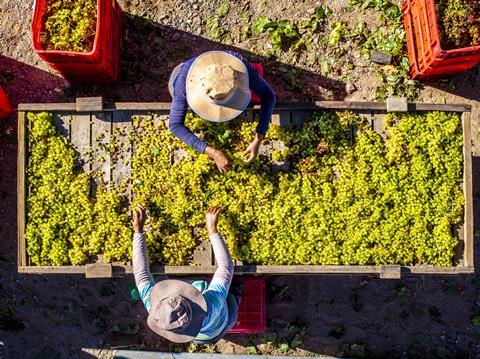This season’s output is forecast to be 150 per cent bigger than a decade ago, industry body Raisins South Africa has revealed

South Africa’s raisin production is on track to surpass 100,000 tonnes for the first time in 2025, according to Raisins South Africa.
The milestone, which is subject to the impact of weather, would solidify the country’s role as a ”significant player in the industry”, the industry body said, highlighting not only its volume growth but also a ”steadfast dedication to food safety and quality standards”.
Producers in the country have substantially increased plantings in recent years, with new hectares coming into full production, new cultivars producing better yields and growers reporting healthy vines.
This season’s output is forecast to be 150 per cent bigger than a decade ago, as South Africa moves from a middle-ranking international supplier to join leading producers such as Turkey, Iran and the US.
With last year’s Northern Hemisphere crop taking a substantial hit from a series of damaging weather events, Southern Hemisphere sources have identified an opportunity to boost their share in key European markets.
South Africa represents around 50 per cent all of Southern Hemisphere raisin production, giving its producers the chance to enter markets where there has been a shortage of supply.
Turkish production fell by one-third in 2023/24 as a result of heavy rainfall around harvesting time, while a hard winter reduced grape clusters in Iran and adverse weather hit the growing and drying seasons in California.
That combination of events has left carry-over stock depleted on global markets.
“Due to climate changes and geographical risks, buyers are looking to diversify a bit more, and South Africa is ready as a supplier of top-quality raisins in terms of food safety and best practice,” said Ferdie Botha, chief executive of industry body Raisins SA. “That ultimately ensures a happy and safe consumer.”
Demand has also been boosted by the growing popularity of raisins generally.
Figures from Tridge show the UK is the world’s fourth-largest importer of raisins and bought some £503m in 2023, up 0.3 per cent on the year before.
Producers also believe there is major opportunity for the dried fruit in the fast-growing healthy snacking segment.
So far this season, some 4,700 tonnes of South African raisins have been exported to the UK, with the hope that a total of 10,000 tonnes could be reached by the season’s end.
“We would be ecstatic if that materialises,” said Botha. “We hope that we can have a great season, with prospects looking good from a market perspective.”
On the ground in South Africa, conditions are looking favourable but growers are continuing to be vigilant for signs of frost as the seasons change from winter into spring.
After well-documented issues at the ports in the past two years, Raisins SA stressed that the situation had improved, with alternative ports available and providing the opportunity to decrease shipping times.
Overall, it was a feeling of positivity for the months ahead, Both confirmed.
“We have made progress as an industry in South Africa, growing volumes in various markets and exposing buyers who do not traditionally buy from us to our exceptional product,” he concluded.
“We hope that through great client service, exceptional quality and growing volumes, we will become more relevant as a supplier of top-quality product to premium markets.”



